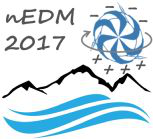Speaker
Dr
Geza Zsigmond
(Paul Scherrer Institut)
Description
In UCN physics experiments Monte Carlo simulation methods are very effective in the characterization and optimization of many-parameter systems, and when a detailed calculation of a geometry containing several sub-volumes is relevant. Exact analytic modeling is not feasible in many cases - for example because of gravity effects on UCN or because of UCN viewing several surface qualities at the same time.
MCUCN has been extensively used in the optimization of the PSI UCN source, beamlines and experiments in order to maximize UCN density or transmission. MCUCN has already been a useful tool in estimating systematic effects in the neutron electric dipole moment (nEDM) experiment, for checking data analysis software by toy data, or as part of the data analysis (providing e.g. collision rates).
In this presentation we briefly explain several recent applications of MCUCN, with emphasis on the future n2EDM apparatus at PSI and on spin tracking simulations for the R-curve analysis in the current experiment.
| geza.zsigmond@psi.ch |
Primary author
Dr
Geza Zsigmond
(Paul Scherrer Institut)

